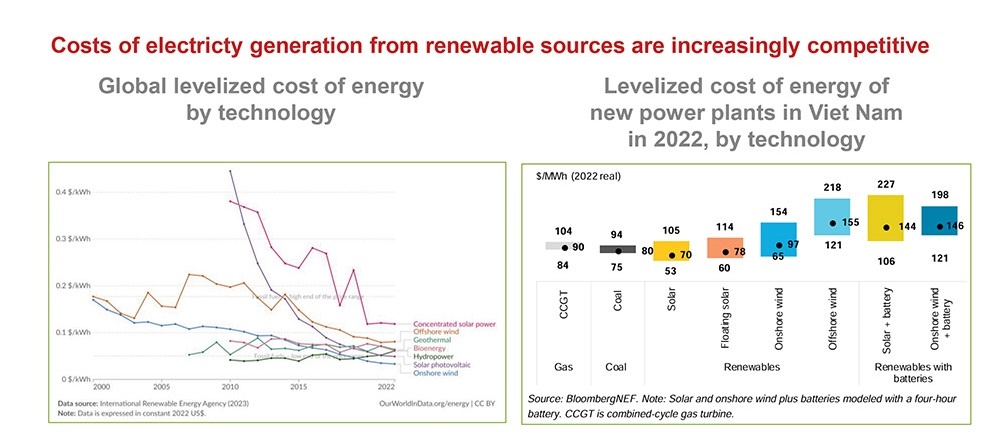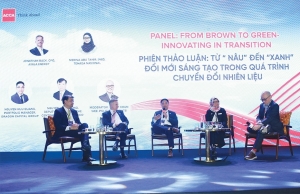Energy players look to deeper innovation to boost transition
Nguyen Mai Duong, director of the Ministry of Science and Technology’s Technology Development and Innovation Department, said at the Vietnam Energy Transition Forum 2024 last week in Hanoi that Vietnam’s electricity consumption in 2024 will increase by about 15 per cent.
“Electricity demand will grow about 8-10 per cent per year in the coming years,” Duong said. “In addition to implementing synchronous solutions and optimising existing energy supply, transmission, distribution and use systems, investing and developing new solutions is also an urgent need for Vietnam.”
 |
The rapid increase in variable renewable sources requires greater flexibility in the electricity system and, in addition to traditional technologies, the power system needs to be invested in new tech to increase system flexibility, he added.
“Innovation requires a diverse group of participants, including governments, researchers, investors, entrepreneurs, corporations, and civil society. These groups all contribute significantly to the generation of ideas for new or improved technologies,” Duong said.
Fabian Hartjes, second secretary of Climate Diplomacy at the German Embassy to Vietnam, said that Germany was ranked fourth globally in installed capacity according to the International Renewable Energy Agency in 2023, although the sunshine hour index is modest compared to countries in Southeast Asia.
“We highly appreciate the investment attraction environment in Vietnam and see business opportunities here. German businesses will increase investment here and are always ready to share renewable energy tech with Vietnam,” Hartjes said. “Innovative technologies have proven to be highly effective and have actively supported our energy transition as well as many other countries, and renewable forms of energy and efficiency will shape our new world.”
The transition process requires cooperation from public and private agencies, and the opportunity for cooperation between Vietnam and Germany is huge, Hartjes added.
Experience shows that a successful transition requires four core elements: a competitive economy, an open market; supportive policies, and especially technology, according to Philipp Munzinger, director of the German Development Agency’s Energy Support Programme.
“The main trends in the current energy transition include economical and efficient, promoting the development of renewables in the electricity industry, green transportation, and green hydrogen,” he said. “The majority of new electricity capacity will come from solar and wind power, given the rising competitiveness of renewable energy prices and the costs associated with electricity generation.”
Munzinger added that solar power production and storage is leading the renewable energy tech market with an increasingly expanding scale. “This is bringing benefits for investors as well as contributing to energy security and grid stability. Therefore, solar power production and battery storage technology need policies to be developed,” he said.
Technology also helps reduce the cost of generating electricity from renewable sources. The levelised cost of energy (LCOE) of solar power in Vietnam has decreased sharply, thanks to advances in technology and the growth of market size. Data from energy researcher BloombergNEF shows that the LCOE for a solar power plant is at $53-105 per MWh (according to actual prices in 2022), making this possibly the most important, cheapest, and competitive source of electricity generation in Vietnam.
Similar to wind power plants, the LCOE of wind power has also decreased significantly, at $65-154 per MWh. In particular, offshore wind power is becoming a high-potential field with increasingly reasonable costs and stable electricity production ability.
 | Wide participation can boost nation’s energy transition Vietnam is pushing ahead with the energy transition by involving synchronous solutions and joint contributions of society. |
 | Renewable energy on the table for Vietnam Vietnam is considered a fertile ground for the renewable energy industry, according to the May 28-29 forum. |
 | Brown to green switch accelerates The greening of the economy is being spurred on by a wide range of stakeholders, taking in energy transition, business changes, and government policy. |
What the stars mean:
★ Poor ★ ★ Promising ★★★ Good ★★★★ Very good ★★★★★ Exceptional
Related Contents
Latest News
More News
- Trung Nam-Sideros River consortium wins bid for LNG venture (January 30, 2026 | 11:16)
- Vietnam moves towards market-based fuel management with E10 rollout (January 30, 2026 | 11:10)
- Envision Energy, REE Group partner on 128MW wind projects (January 30, 2026 | 10:58)
- Vingroup consults on carbon credits for electric vehicle charging network (January 28, 2026 | 11:04)
- Bac Ai Pumped Storage Hydropower Plant to enter peak construction phase (January 27, 2026 | 08:00)
- ASEAN could scale up sustainable aviation fuel by 2050 (January 24, 2026 | 10:19)
- 64,000 hectares of sea allocated for offshore wind surveys (January 22, 2026 | 20:23)
- EVN secures financing for Quang Trach II LNG power plant (January 17, 2026 | 15:55)
- PC1 teams up with DENZAI on regional wind projects (January 16, 2026 | 21:18)
- Innovation and ESG practices drive green transition in the digital era (January 16, 2026 | 16:51)

 Tag:
Tag:



















 Mobile Version
Mobile Version